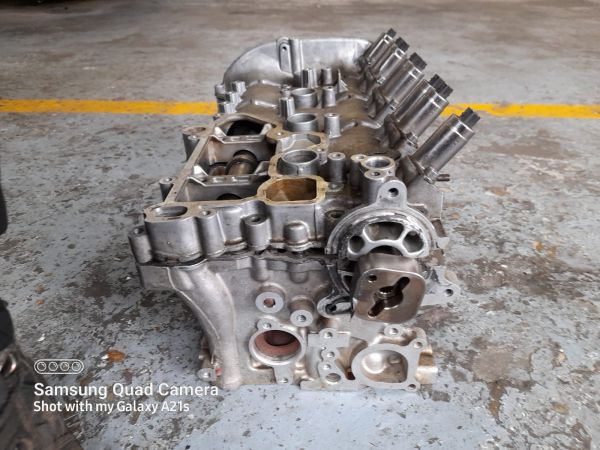Understanding the Golf 7 GTI Engine: Key Specifications and What They Mean for You
Your Overview to the Golf 7 GTI Engine: Integrity and Upgrades
The Golf 7 GTI, geared up with its 2.0-liter turbocharged inline-four engine, stands for an equilibrium of efficiency and integrity that interest enthusiasts and everyday chauffeurs alike. Comprehending the aspects that add to its stability, along with potential issues and their solutions, is crucial for taking full advantage of the driving experience. Moreover, exploring various performance upgrades can significantly enhance both power and efficiency. Nonetheless, the concern stays: what particular upgrades can transform your GTI into a truly phenomenal vehicle while guaranteeing its long life?
Introduction of the Golf 7 GTI Engine
The heart of the Golf 7 GTI is its 2.0-liter TSI engine, a turbocharged four-cylinder that supplies a remarkable mix of power and effectiveness. This engine generates a durable 220 horsepower and 258 lb-ft of torque, permitting the lorry to increase from 0 to 60 miles per hour in just 5.6 secs, showcasing its sporty personality. The turbocharged design not just enhances efficiency yet likewise optimizes gas efficiency, making it a sensible choice for day-to-day driving.
Incorporating innovative modern technology, the engine features straight fuel shot, which improves combustion performance and decreases exhausts. Additionally, the Golf 7 GTI is furnished with either a six-speed guidebook or a six-speed DSG dual-clutch transmission, giving chauffeurs with the adaptability to choose their favored driving style. The car's front-wheel-drive format, combined with a well-tuned suspension, makes sure agile handling and a responsive driving experience.
Engine Integrity Factors
Dependability is a critical facet of any type of performance-oriented automobile, and the Golf 7 GTI's engine is no exemption. Several elements add to the total reliability of this highly concerned powerplant, which is important for both day-to-day driving and perky efficiency.
Firstly, the Golf 7 GTI is geared up with a robust 2.0-liter turbocharged inline-four engine, known for its efficient design and solid engineering. This engine features a forged steel crankshaft and light weight aluminum engine block, which provide exceptional stamina and resilience while lowering weight.
Second of all, normal maintenance plays a crucial duty in enhancing engine integrity. Following the producer's recommended service periods, making use of top notch lubricating substances, and replacing essential components such as trigger filters and plugs can substantially prolong engine life.
Additionally, the quality of gas utilized can also influence reliability. Costs fuel is advised to make sure ideal performance and decrease the danger of knocking or detonation.
Finally, the car's electronic monitoring system constantly keeps track of engine criteria, enabling for real-time adjustments to maximize performance and performance while securing against possible issues. Jointly, these elements emphasize the Golf 7 GTI engine's track record for reliability amongst enthusiasts and everyday drivers alike.
Typical Issues and Solutions
The Golf 7 GTI, while commemorated for its performance, is not without its difficulties. Amongst the most regularly reported issues are engine oil usage and turbocharger failings, which can considerably influence car integrity. Understanding these typical troubles and their services is crucial for keeping optimal engine efficiency.

Engine Oil Intake
While numerous fanatics appreciate the efficiency of the Golf 7 GTI, engine oil consumption can arise as a noteworthy problem. Owners might notice that their automobiles call for more constant oil top-ups than expected, typically credited to various aspects integral in the engine's style and procedure.
One usual issue is the engine's straight gas injection system, which can result in enhanced oil usage as a result of the combustion process. In addition, making use of high-performance driving practices can aggravate oil burn-off, particularly under aggressive throttle conditions. Motorists may additionally experience oil leaks from gaskets and seals, which can add to minimized oil degrees.
Routine oil changes using high-quality artificial oil can aid preserve optimal engine efficiency and long life. If extreme intake lingers, it may be advisable to get in touch with a specialist specialist to evaluate the engine for potential interior problems, such as used piston rings or shutoff seals.
Turbocharger Failings
Turbocharger failings can significantly affect the performance of the Golf 7 GTI, leading to reduced power and efficiency. Oil leaks usually stem from used seals or damaged gaskets, which can lead to oil contamination and succeeding engine damages.
One more widespread problem is wastegate failure, which can cause overboost or underboost conditions. If left unattended, this not just influences the car's efficiency yet can additionally lead to severe engine damage. Upgrading to an extra robust wastegate can boost integrity and performance.
Excessive shaft play shows wear in the turbocharger's bearings, which can result in a complete turbo failure. Monitoring increase stress and paying attention for unusual noises can aid detect this issue early.
To avoid turbocharger failings, normal maintenance, including oil changes and air filter replacements, is vital. In addition, buying premium aftermarket elements might offer better integrity and efficiency, eventually boosting the driving experience of the Golf 7 GTI.
Performance Upgrades to Consider
What performance upgrades can truly boost the driving experience of a Golf 7 GTI? To release the complete possibility of this legendary hot hatch, a number of targeted modifications can boost power, handling, and total driving enjoyment.
One of the most reliable upgrades is a high-performance turbocharger. Replacing the stock unit with an aftermarket choice can substantially boost horsepower and torque, delivering a more exhilarating velocity experience. Enhancing this upgrade with a performance intercooler helps maintain optimal temperatures, ensuring regular power distribution.
Next, consider updating the exhaust system. A much less restrictive exhaust not just boosts engine effectiveness however additionally creates a much more hostile audio that intensifies the auto's stylish character. Pairing this with a remapped ECU will certainly optimize gas delivery and ignition timing, additional boosting efficiency.
Suspension upgrades, such as adjustable coilovers, can boost dealing with by decreasing the car's center of mass and lowering body roll. Furthermore, a set of high-performance tires will certainly enhance hold, permitting sharper cornering and boosted overall security.
Together, these upgrades can transform the Golf 7 GTI right into a more awesome and dynamic driving maker, making every journey a remarkable experience. golf 7 gti engine.
Suggested Upkeep Practices
Maintaining the Golf 7 GTI engine needs interest to essential techniques that guarantee optimum performance and durability. Normal oil changes are crucial for engine health and wellness, while prompt timing belt substitute is important to avoid potential failures. Applying these maintenance methods will certainly help keep your lorry running smoothly and effectively.
Routine Oil Adjustments
Regular oil modifications are crucial for the optimal performance and durability of the Golf 7 GTI's engine. Preserving a regular oil adjustment schedule guarantees that the engine runs efficiently and successfully. The advised interval for oil changes is usually every 5,000 to 10,000 kilometers, relying on driving problems and the kind of oil made use of.
Making use of top quality synthetic oil is important as it supplies remarkable lubrication and thermal security contrasted to standard oils. This is specifically vital for the Golf 7 GTI, which includes a turbocharged engine that generates higher operating temperatures. Regular oil changes help to remove impurities and sludge build-up, which can endanger engine efficiency and cause early wear.
Additionally, fresh oil boosts gas performance and minimizes dangerous discharges, contributing to a cleaner atmosphere. During the oil change procedure, it is likewise recommended to replace the oil filter to make sure ideal filtration and prevent any kind of particles from going into the engine. Adhering to these techniques not just helps maintain the engine's honesty but additionally protects the value of the vehicle, making normal oil alters an important facet of accountable GTI ownership.
Timing Belt Substitute
The timing belt is a critical part of the Golf 7 GTI's engine, in charge of integrating the rotation of the crankshaft and camshaft. This synchronization is crucial for ideal engine efficiency and effectiveness. If the timing belt fails, it can bring about devastating engine damages, making timely substitute important.

When intending a timing belt replacement, it is advisable to additionally replace the water pump and tensioner. These parts work in combination with the timing belt and typically experience similar wear, guaranteeing optimum performance and long life. Using OEM components is recommended for their integrity and compatibility with the Golf 7 GTI's engine.
Professional installment is highly motivated, as improper setup can bring about serious engine breakdowns. Routine check this site out maintenance of the timing belt not only shields the stability of the engine yet also improves the total driving experience of the Golf 7 GTI. golf 7 gti engine. Prioritizing this task assists keep lorry integrity and performance over time
Aftermarket Components and Alterations
Various lovers transform to aftermarket adjustments and components to enhance the efficiency and aesthetic appeals of the Golf 7 GTI. These upgrades can significantly improve the automobile's responsiveness, taking care of, and overall driving experience. Popular modifications include high-performance air intakes, exhaust systems, and intercoolers, which can boost horse power and torque by maximizing air intake and exhaust flow.
Suspension upgrades are also common, with choices varying from decreasing springtimes to fully adjustable coilover kits that enhance trip high quality and cornering ability. Upgraded brakes, consisting of efficiency pads and blades, can give far better quiting power, making certain security and control throughout spirited driving.
Aesthetic adjustments, such as aftermarket wheels, body sets, and custom-made illumination, allow owners to personalize their cars while maintaining a sporty look. Engine adjusting, whether via ECU remapping or standalone engine monitoring systems, can open extra performance potential, making the GTI even more exhilarating to drive.
While aftermarket modifications can generate substantial advantages, it's necessary to select trustworthy brand names and think about the prospective effect on service warranty and integrity. Appropriate setup and adjusting are critical to make certain the durability of the car while delighting in the improvements.
Enhancing Gas Efficiency
Improving gas effectiveness in the Golf 7 GTI can result in significant price savings and a reduced ecological impact. Attaining much better fuel economic situation needs a combination of driving routines, maintenance techniques, and tactical modifications.
One efficient method is embracing a smooth driving style, staying clear of fast velocity and heavy stopping, which can considerably decrease gas consumption. Keeping optimal tire stress is also vital; under-inflated tires can enhance rolling resistance, bring about lowered performance. Regular maintenance, including engine tuning and air filter substitutes, ensures that the engine runs at peak efficiency, even more improving gas economic situation.
For those seeking upgrades, take into consideration a performance tune that concentrates on efficiency as opposed to large power. Eco-mode setups, if available, can change throttle reaction and change indicate make best use of fuel cost savings. In addition, light-weight aftermarket wheels can reduce weight and enhance performance without endangering performance.
Lastly, utilizing wind resistant enhancements, such as a front splitter or rear spoiler, can minimize drag at greater rates, adding to better fuel economic climate. By carrying out these modifications and techniques, Golf 7 GTI owners can delight in improved gas performance while keeping the lorry's perky driving features.
Conclusion
In final thought, the Golf 7 GTI engine exemplifies a mix of efficiency and dependability, driven by a well-engineered 2.0-liter turbocharged inline-four. Various efficiency upgrades and aftermarket adjustments can enhance driving experience while keeping reliability.
The Golf 7 GTI, geared up with its 2.0-liter turbocharged inline-four engine, stands for an equilibrium of performance and integrity that charms to fanatics and day-to-day chauffeurs alike. Routine oil modifications using high-quality artificial oil can help keep optimal engine efficiency and durability.Normal oil modifications are essential for the ideal efficiency and long life of the Golf 7 GTI's engine. Regular maintenance, including engine adjusting and air filter replacements, makes sure that the engine operates at peak performance, home better improving gas economic climate.
